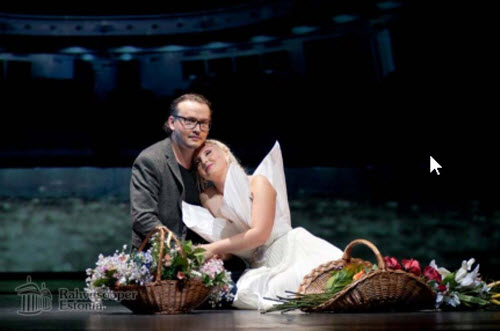 Estonia Tõnu KÕRVITS Liblikas (Butterfly). Soloists, Estonian National Opera Chorus, Orchestra and Estonian National Ballet, Risto Joost (conductor). Estonian National Opera, Tallinn1 November 2013 (GF)
Estonia Tõnu KÕRVITS Liblikas (Butterfly). Soloists, Estonian National Opera Chorus, Orchestra and Estonian National Ballet, Risto Joost (conductor). Estonian National Opera, Tallinn1 November 2013 (GF)

Photo Courtesy of Estonian National Opera.
Cast:
Erika – Kadri Kipper
Erna/Ophelia – Helen Lokuta
August – Andres Köster
Theodor/Hamlet – Rauno Elp
Dancers – Gabriel Davidsson, Daniel Kirspuu, Kaja Kreitzberg, Mari Lofitskaja, Maigret Peetson, Hedi Pundonen
Production:
Stage Director: Peeter Jalakas
Designer: Liisi Eelmaa
Lighting Designer: Anton Kulagin
Choreographer: Kati Kivitar
Video Designer: Emer Värk
Liblikas (Butterfly) was commissioned for the 100th anniversary of the house of the Estonia Theatre and Concert House and was premiered on 13 September 2013. The libretto is by Maria Lee Liivaku and Lauri Kaldoja, based on a novel by Andrus Kiviräkh. The composer Tönu Körvits (b. 1969) was born in Tallinn and studied at the EstonianAcademy of Music. He made his debut at the Estonian Music Festival in 1993 and since then his works have regularly been featured there. In 1994 his guitar concerto was chosen to represent Estonia at the International Rostrum of composers in Paris. His music has been played in several European countries and besides his ‘classical’ composing he is also known as an arranger of popular music. He was a nominee for the Estonian Music Award ’98 in the Best Arranger category and has composed several film scores. There are also a couple of chamber operas to his credit.
Liblikas is a dream-like opera with a kind of fairy-tale story merged in but the story in itself is very realistic, insofar as the frame story deals with the opening of the theatre and the premiere performance: Hamlet. Here is the actor August Michelson and the dancer Erika Tetzky and their love relation and also Erna Villmer (Ophelia) and Theodor Altermann (Hamlet). Erika is birdlike, dances like a butterfly and in the beginning of the second act August, who is the narrator and reminisces the early history of the theatre, tells us that Erika’s father was a miller and her mother a bird, who threw away her feathers and became the miller’s wife. Earlier on we have already learnt about Erika’s relation with birds when a flock of them warns her that it will soon be winter and she should fly with them to the south. In the last scene of the opera Erika (Butterfly) plans to fly with the other birds but in the last resort she chooses to stay with August, whom she loves, in spite of the cold. Snow begins to fall and she dies in the arms of August.
It is a moving story that after a slightly hesitant start spreads its wings in the second act and, both dramatically and musically, sails ever higher in intensity, emotionality. Sets are sparse but the lighting design is evocative, there are dramatic projections, costumes fanciful and funny, there are a lot of technical gags with moving furniture and things and when in act II Hamlet has a monologue in classical pose with death’s head in hand, the skull suddenly lifts and sails up in the blue. Reality and tale, past and present, comedy and tragedy mix, in particular during the first act, and I believe that the more organically compound second act also inspired the composer to give of his best. The concept with the historical flashbacks is of course eminently suitable for an anniversary production, but for future use I think it would be even better with a condensation of the first act.
The opening music, eerie and dreamlike, gives exactly the right signals, sets the mood for what is to follow. August in everyday dress enters from the stalls and his opening monologue is not monotonous but not very melodious either. Occasionally it is reminiscent of Janacek. There are streaks of neo-classicism in some music that follows but when the emotions grow stronger it is a late-romantic sound-world we are embedded in, with echoes of Gil Evans’s tuba band as seasoning. The first scene of act II is intensely dramatic and the tension never slackens after that. In scene 3 there is an ethereal chorus in candle-light and in scene 4 Ophelia’s final aria is immensely beautiful. In translation:
In the end, theatre is only a dream
nourished by sleep and air –
theatre is a predator eating away our lives,
yearning for a divine spark
to unite everyone around the stage.
What would we have without it?
– a summing-up as good as any of not only the theatre but the arts in general.
Kadri Kipper, a new name to me, was a lovable Erika, Helen Lokuta’s double-bill as Erna and Ophelia was another bright feather in her already lavishly adorned hat, Andres Köster sang well and acted simply and naturally as August and the experienced Rauno Elp never put a foot wrong, either as Theodor or as a very Elizabethan Hamlet.
In the programme booklet there are role photos of the four actors from the beginning of the last century who return to the stage for this anniversary, impersonated by the present cast. The likeness to the originals was exactly striking but that was assuredly not the intention. Liblikas will be played twice during the spring season 2014 and I hope it will remain in the repertoire also after that. New operas are not thick on the ground these days – and this one has many qualities that should make it popular.
Göran Forsling